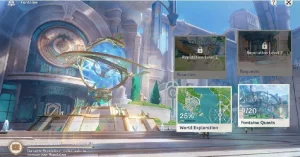
In a misty water element kingdom, I opened the Genshin Impact client after the system was updated. At that moment, it was like Bohr’s first time seeing the wave function cloud map of electrons-everything was blurry, but it had its own inevitable orbit.
“You have opened the daily commission of Fontaine.” Catherine said to me in that heat-free synthesized voice, without a trace of random thermal disturbance in her voice.
I suddenly realized that this was not a simple game prompt, but an invitation from the universe to people – an ontological call.
—
Let’s start with the appearance.
In this commission system, players can accept four tasks every day, and after completing them, they can obtain experience, rough stones and reputation points. This mechanism is like Boltzmann’s definition of entropy: each “completion” is a state collapse, the information entropy of the system gradually decreases, and the player’s “reputation” gradually increases.
But what is reputation?
Is it a cognitive function of the city to you? Is it a vote of confidence in Fontaine’s Bayesian posterior probability after continuous revision?
Or is it just a positive incentive variable that the system designer hopes you will continue to participate in?
Based on the certainty of classical physics, we can assume that as long as the player keeps consistent behavior, the system will output rewards stably. However, in the country of Fontaine, the law is not absolute, it is centered on “judgment” – just like observation in quantum mechanics, the meaning of an event is not determined by itself, but depends on the way it is observed.
So, you think you are doing the task, but in fact, it is the system that is “observing” you.
—
You helped the researcher retrieve the out-of-control underwater device.
You drove away the escaped phantom.
You went to the court to submit the materials.
You completed all the commissions and got the reward.
Is all this the result of free choice? Or, is it really you – the traveler – who is taking action?
Let us temporarily quote Hume’s question: “Do people really have free will?” In the Fontaine system, does your “choice” really go beyond the task option box?
—
In the system settings, the reputation system is divided into ten levels. Each level corresponds to a set of “unlocks”: from the map identification function, to the prop “Water Phantom Identifier”, to the “Folding Light Cone” – the latter setting seems to directly borrow the concept of space folding in string theory.
I began to suspect that this entire reputation system is essentially a hierarchical “Turing test”.
The system is asking:
When we give a virtual body (that is, you, the traveler) a series of tasks, when it starts to act, respond, and grow according to the rules, can we say that it “has consciousness”?
Or ask the other way around:
When you act according to the system, complete the commission, and collect rewards-are you still “conscious”?
Quantum mechanics tells us that the world is not deterministic, but probabilistic.
But the game system is not. It is a finite state automaton, and each state is set by an algorithm.
So, in the commission system, we see a paradoxical existence: **You, as a traveler, are in an unstable state between freedom and mechanism. **
You choose the task, but the task is listed by the system.
You complete the commission, but the reward is issued linearly.
You are improving your reputation, but in essence, you are walking along a known function curve.
—
I think of the paradox of Maxwell’s demon.
In the world of thermodynamics, the demon controls the change of information entropy by constantly observing the energy state of particles and opening or closing small doors. It does not participate in the movement, but dominates the direction of the entire system.
The system itself is Maxwell’s demon.
You are busy running around in the game world, doing tasks, increasing reputation, and receiving rewards.
It quietly records your behavior patterns, induces you to become attached to the city, trust the mechanism, and finally allows you to stay “voluntarily”.
Perhaps the real miracle is not “getting rewards”, but one day you stop, look up at the zenith of Fontaine, and ask: **”Why do I do all this?”**
—
Perhaps, this is the greatest irony and tenderness of the Fontaine reputation system in “Genshin Impact”.
It is both a rational rule deduction and a perceptual human laboratory.
You are needed, you are rewarded, and you are loved.
But is all this just a branch statement in the algorithm setting?
The system will not tell you the answer, just like Schrödinger’s cat will never prove its own life or death.
But you can choose: after completing today’s commission, put down the handle, close your eyes, and ask:
**”In this seemingly real simulation, do I still exist?”**
—
